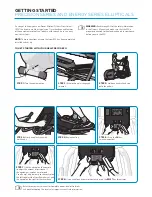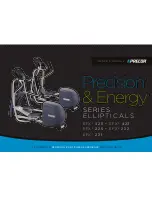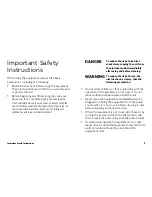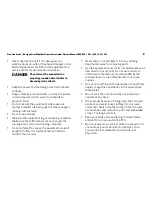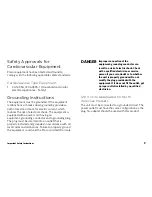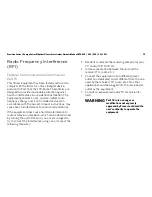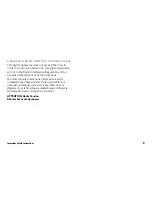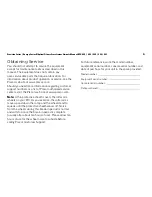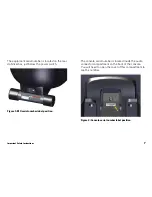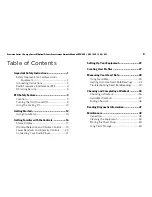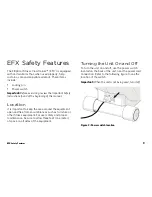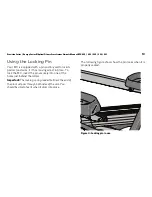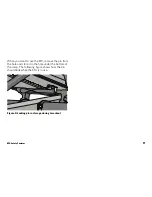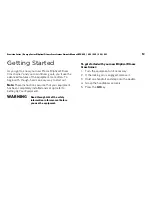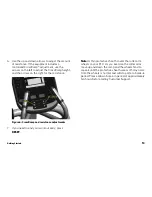
WELC
OME TO A
PERSONALIZED FITNESS EXPERIENCE
FOR Y
OUR HOME
Quick
Start
Card
PRECISION
™
SERIES
AND ENERGY
™
SERIES
ELLIPTICALS
HEART RA
TE INFORMA
TION
CHOOsE A WORKOUT
• Determine your level of fitness: beginner,
intermediate, or advanced.
• Determine your immediate goal: endurance
training, cardio-conditioning, or weight loss.
If you are a beginner, start with a cardio-conditioning
workout to gradually adjust your body to the demands of
exercise. Over a recommended eight-week period, you will
increase your endurance and strength.
For all fitness levels, plan to exercise at an appropriately
challenging pace for 20 to 30 minutes a day. Wear a chest
strap to monitor your heart rate. Supplement your plans
with fitness workouts from the Precor web site
(www.precor.com). The Precor web site also provides
expert advice to help you reach your fitness goals.
MONITOR YOUR HEART RATE
The SmartRate and heart rate displays provide visual cues
that help you adjust your fitness routine to reach your
goals. Use these features to keep your heart rate within
the target zones.
Wear a Chest Strap
During a workout, the heart rate features appear on
the display when you wear a chest strap. To receive an
accurate reading, the chest strap needs to be in direct
contact with your skin. After you put on the chest strap,
face the display console for a minimum of 15 seconds. This
allows the receiver in the console to recognize the signal
from the chest strap.
1. Carefully dampen the back of the strap with tap
water (Diagram A).
Important:
Do not use deionized water. It does
not have the proper minerals and salts to conduct
electrical impulses.
2. Adjust the strap and fasten it around your chest.
The strap should feel snug, not restrictive
(Diagram B).
3. Make sure that the chest strap is right side up, lies
horizontally across your chest, and is centered in
the middle of your chest (Diagram C).
When these steps are complete, you are ready to view
your heart rate.
touch-Sensitive Handrail Grips
Several Precor products incorporate touch-sensitive
heart rate grips on the handrails. If you prefer to use
the touch-sensitive handrail grips, use both hands.
Make sure both hands are moist (not dry) and avoid
grasping the sensors too tightly.
note:
For the best heart rate monitoring results, wear a
chest strap.
sMARTRATE® FEATUREs
When you begin an exercise session, a blinking
segment in the SmartRate display appears if you
entered your age during the setup phase. The blinking
segment indicates the current zone of your heart rate.
The calculation used for the heart rate target zone is
your maximum aerobic heart rate:
207 - (age x 0.67), multiplied by a percentage.
For the ideal weight loss range, your heart rate should
remain between 55% and 69% of your maximum
aerobic heart rate. To improve your overall
cardiovascular and respiratory fitness level, maintain
your heart rate between 70% and 85% of your
maximum aerobic heart rate. For the greatest benefits,
maintain your heart rate in either zone for 30 minutes or
more at least three times a week.
CaUtIon: Your heart rate should never exceed
85% of your maximum aerobic heart rate or go
above your target zone (Diagram D).
COOl DOWN AFTER YOUR WORKOUT
Cooling down is an important aspect of your workout
because it helps reduce muscle stiffness and
soreness by transporting excess lactic acid out of the
working muscles. Cooling down for at least three
minutes helps provide a smooth transition that allows
your heart rate to return to its normal, non-exercising state.
20031 142nd Avenue NE | P.O. Box 7202
Woodinville, WA USA 98072-4002
www.precor.com
P/N 303172-112 | ©2014 Precor Incorporated
Diagram D: Heart Rate Target Zones
Diagram A
Diagram B
Diagram C
Choose a Program
•
Determine your level of fitness: beginner,
intermediate, or advanced.
•
Determine your immediate goal: endurance
training, cardio-conditioning, or weight loss.
If you are a beginner, start a cardio-conditioning
program to slowly adjust your body to a comfortable
level of exercise. Over a recommended 8-week
period, you will increase your endurance and strength
while improving flexibility.
If you have been exercising and feel that you have
reached an intermediate or advanced fitness level, you
probably have established goals for yourself.
For all fitness levels, plan to exercise at a comfortable
pace for 20 to 30 minutes a day. Wear a chest strap
to monitor your heart rate. Supplement your plans
with fitness workouts from the Precor web site
(www.precor.com). The Precor web site also provides
expert advice to help you reach your fitness goals.
Monitor Your Heart Rate
The SmartRate and heart rate displays provide visual
cues that help you adjust your fitness routine to reach
your goals. Use these features to keep your heart rate
within the target zones.
Wear a Chest Strap
During a workout, the heart rate features appear on
the display when you wear a chest strap. To receive
an accurate reading, the chest strap needs to be in
direct contact with your skin. After you put on the
chest strap, face the display console for a minimum of
15 seconds. This allows the receiver in the console to
recognize the signal from the chest strap.
1. Carefully dampen the back of the strap with tap
water (Diagram A).
Important:
Do not use deionized water. It does
not have the proper minerals and salts to conduct
electrical impulses.
2. Adjust the strap and fasten it around your chest.
The strap should feel snug, not restrictive
(Diagram B).
3. Make sure that the chest strap is right side up, lies
horizontally across your chest, and is centered in
the middle of your chest (Diagram C).
When these steps are complete, you are ready to view
your heart rate!
Touch-Sensitive Handrail Grips
Several Precor products incorporate touch-sensitive
heart rate grips on the handrails. If you prefer to use
the touch-sensitive handrail grips, use both hands.
Make sure both hands are moist (not dry) when you
grasp the touch-sensitive handrail grips.
SmartRate
®
Features
When you begin an exercise session, a blinking
segment in the SmartRate display appears if you
entered your age during the setup phase. The blinking
segment indicates the current zone of your heart rate.
The calculation used for the heart rate target zone is
your maximum aerobic heart rate:
(220 minus your age) multiplied by a percent.
For the ideal weight loss range, your heart rate should
remain between 55% and 70% of your maximum
aerobic heart rate. To improve your overall
cardiovascular and respiratory fitness level, maintain
your heart rate between 70% and 85% of your
maximum aerobic heart rate.
For the greatest benefits, maintain your heart rate in
either zone for 30 minutes or more at least three times
a week.
CAUTION: Your heart rate should never exceed
85% of your maximum aerobic heart rate or go
above your target zone (Diagram D).
Diagram D
Cool Down After Your Workout
Cooling down is an important aspect of your workout
because it helps reduce muscle stiffness and
soreness by transporting excess lactic acid out of the
working muscles. Cooling down for at least three
minutes helps provide a smooth transition that allows
your heart rate to return to its normal, non-exercising
state.
Diagram A
Diagram B
Diagram C
20 25 30 35 40 45 50 55 60 65 70 75
70
80
90
100
120
130
140
150
160
170
180
190
200
110
Heart Rate Target Zones
Your Age
Y
o
u
r Hea
rt R
a
te
Peak
Cardio
Warmup
Reco
mmen
ded C
ardio
vascu
lar Zo
ne
Recom
mende
d Weig
ht Loss
Zone
Fatburn
High
Precor Incorporated
20031 142nd Avenue NE
P.O. Box 7202
Woodinville, WA USA 98072-4002
www.precor.com
HR INFO 48140-104
©2007
Precor Incorporated
Choose a Program
•
Determine your level of fitness: beginner,
intermediate, or advanced.
•
Determine your immediate goal: endurance
training, cardio-conditioning, or weight loss.
If you are a beginner, start a cardio-conditioning
program to slowly adjust your body to a comfortable
level of exercise. Over a recommended 8-week
period, you will increase your endurance and strength
while improving flexibility.
If you have been exercising and feel that you have
reached an intermediate or advanced fitness level, you
probably have established goals for yourself.
For all fitness levels, plan to exercise at a comfortable
pace for 20 to 30 minutes a day. Wear a chest strap
to monitor your heart rate. Supplement your plans
with fitness workouts from the Precor web site
(www.precor.com). The Precor web site also provides
expert advice to help you reach your fitness goals.
Monitor Your Heart Rate
The SmartRate and heart rate displays provide visual
cues that help you adjust your fitness routine to reach
your goals. Use these features to keep your heart rate
within the target zones.
Wear a Chest Strap
During a workout, the heart rate features appear on
the display when you wear a chest strap. To receive
an accurate reading, the chest strap needs to be in
direct contact with your skin. After you put on the
chest strap, face the display console for a minimum of
15 seconds. This allows the receiver in the console to
recognize the signal from the chest strap.
1. Carefully dampen the back of the strap with tap
water (Diagram A).
Important:
Do not use deionized water. It does
not have the proper minerals and salts to conduct
electrical impulses.
2. Adjust the strap and fasten it around your chest.
The strap should feel snug, not restrictive
(Diagram B).
3. Make sure that the chest strap is right side up, lies
horizontally across your chest, and is centered in
the middle of your chest (Diagram C).
When these steps are complete, you are ready to view
your heart rate!
Touch-Sensitive Handrail Grips
Several Precor products incorporate touch-sensitive
heart rate grips on the handrails. If you prefer to use
the touch-sensitive handrail grips, use both hands.
Make sure both hands are moist (not dry) when you
grasp the touch-sensitive handrail grips.
SmartRate
®
Features
When you begin an exercise session, a blinking
segment in the SmartRate display appears if you
entered your age during the setup phase. The blinking
segment indicates the current zone of your heart rate.
The calculation used for the heart rate target zone is
your maximum aerobic heart rate:
(220 minus your age) multiplied by a percent.
For the ideal weight loss range, your heart rate should
remain between 55% and 70% of your maximum
aerobic heart rate. To improve your overall
cardiovascular and respiratory fitness level, maintain
your heart rate between 70% and 85% of your
maximum aerobic heart rate.
For the greatest benefits, maintain your heart rate in
either zone for 30 minutes or more at least three times
a week.
CAUTION: Your heart rate should never exceed
85% of your maximum aerobic heart rate or go
above your target zone (Diagram D).
Diagram D
Cool Down After Your Workout
Cooling down is an important aspect of your workout
because it helps reduce muscle stiffness and
soreness by transporting excess lactic acid out of the
working muscles. Cooling down for at least three
minutes helps provide a smooth transition that allows
your heart rate to return to its normal, non-exercising
state.
Diagram A
Diagram B
Diagram C
20 25 30 35 40 45 50 55 60 65 70 75
70
80
90
100
120
130
140
150
160
170
180
190
200
110
Heart Rate Target Zones
Your Age
Y
o
u
r Hea
rt R
a
te
Peak
Cardio
Warmup
Reco
mmen
ded C
ardio
vascu
lar Zo
ne
Recom
mende
d Weig
ht Loss
Zone
Fatburn
High
Precor Incorporated
20031 142nd Avenue NE
P.O. Box 7202
Woodinville, WA USA 98072-4002
www.precor.com
HR INFO 48140-104
©2007
Precor Incorporated
20 25 30 35 40 45 50 55 60 65 70 75
70
80
90
100
120
130
140
150
160
170
180
190
200
110
Y
our Heart Rate
High
Cardio
Warm Up
Your Age
Recomm
ended C
ardiovas
cular Zo
ne
Recomm
ended W
eight Loss
Zone
Fat Burn
CAUTION:
Before beginning any fitness program, see your physician for a thorough examination. Ask your physician about the appropriate target heart rate for your fitness level.


